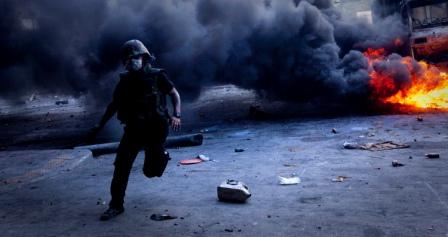Thailand and U.S. Policy
More on:

At this point, the crisis in Thailand has gotten so grave that it verges on civil war and threatens many things, including the democratic gains made over twenty years, the entire legacy of the reign of King Bhumibhol Adulyadej, and Thailand’s tourism-dominated economy. However, as both sides look for mediators to help resolve the crisis, there is an opportunity for the United States to play a constructive role.
Despite the gains made by China in Thailand over the past decade, the United States remains the most important, and respected, outside actor. In 2006, the U.S. decision to essentially not condemn the coup made it easier for the military to take power, and proved a major mistake, as the coup resolved nothing and only made matters worse.
Now, the Obama administration has taken a wise and more nuanced response. Assistant Secretary of State Kurt Campbell smartly decided, during a visit to Thailand, to meet not only with the government but also with some of the leaders of the red shirt protesters. Despite harsh criticism of this decision from the Thai government, it was the correct one. Though some of the red shirts have regrettably employed violent tactics, and though the government has the right to restore order and disperse protests, the broader social complaints represented by the red shirts – let’s remember, they turned out over 100,000 people in Bangkok not long ago – are not going to go away and need to be understood by the United States and other foreign powers. U.S. officials need to broaden their range of contacts in order to understand the dramatic political changes going on in Thailand, and to move beyond the coverage of the country in the English-language Thai media. (Foreign media tend to do a better job of getting a wider range of Thai voices, since they go outside Bangkok more and interview people in the provinces.) Seeking out a broader range of contacts will also show that the red shirt movement is not merely a tool of former prime minister Thaksin Shinawatra.
Continuing a policy of only interacting with Bangkok elites would not be in the United States’ interest and, in the long run, would create the possibility that some Chávez-like tribune of the poor would rise to power and be virulently anti-American.
Assistant Secretary of State Campbell will be returning to Asia in just a few days, with Thailand certainly high on his agenda. He should both endorse the Thai government’s need to restore order – after all, the White House could not let armed men roam around the streets of Washington, DC unchecked – and ignore the Thai government requests that he interact only with government ministers. He also should seek out moderate voices in the red shirt movement, as well as the most moderate and respected leaders who once clustered around Thaksin, like former MP Chaturon Chaiseng.
He should also deliver a firm message to the Thai government that, unlike in 2006, the United States will more aggressively condemn any intervention in electoral politics – a coup, a judicial decision, or the like – just as the Obama administration condemned the coup in Honduras and the potentially rigged election in Iran. (This condemnation could include threatening to cancel Cobra Gold joint exercises, real public condemnation, and a reassessment of other elements of the U.S.-Thai relationship.) Though Thailand may not want to be seen in the company of those two countries, holding a consistent standard about the need for free elections allows the US to better defend its own positions.
More on:
 Online Store
Online Store
